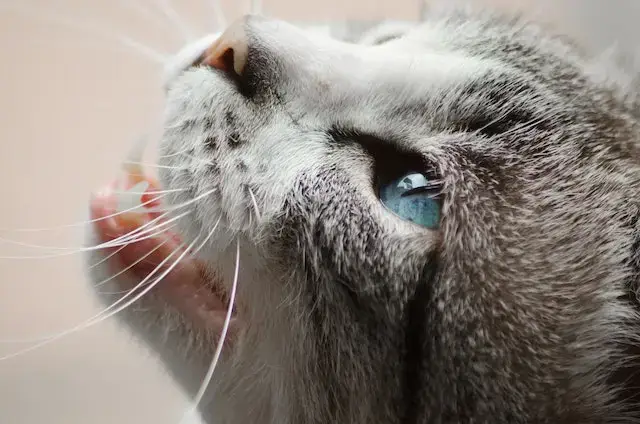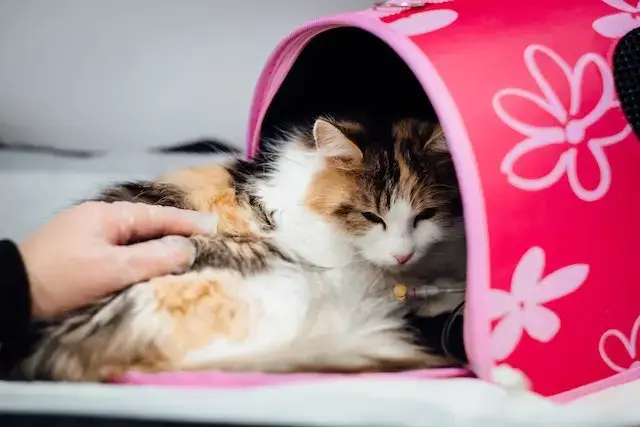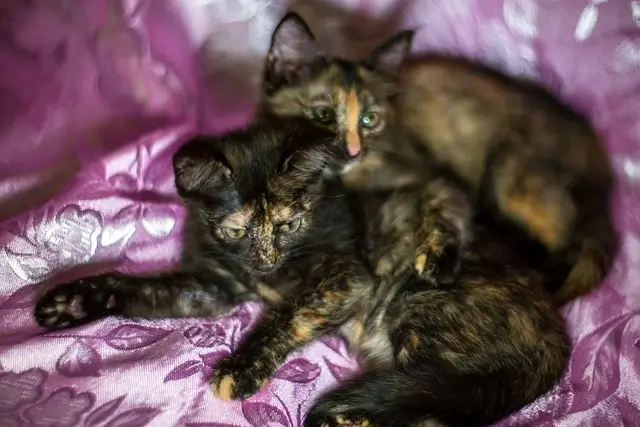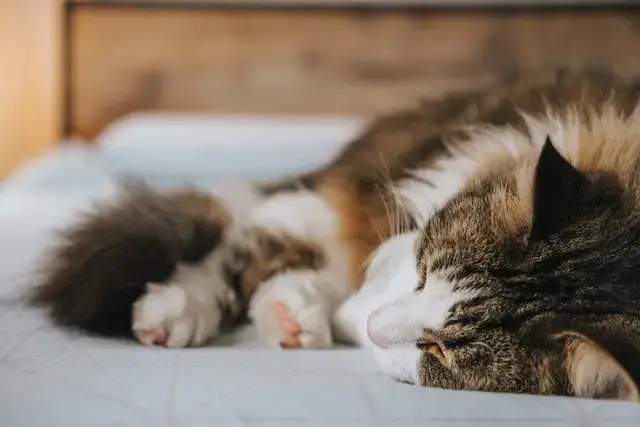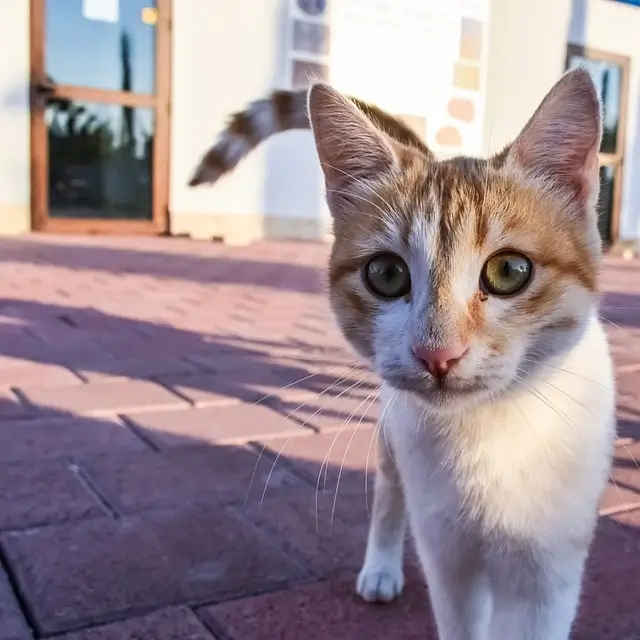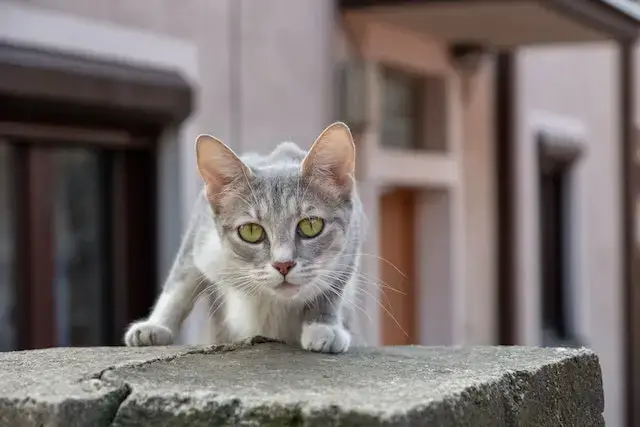Do Feral Cats Meow? No! 7 Reasons Why They Don’t!
So, you are walking from a friend’s home and spot a cat on the way. You move closer to it, only to be disappointed, as the cat immediately runs away.
Chances are you have come across a feral cat, and despite all the ‘meow’ that YOU have been doing, this furry fellow has not said a word to you, which has probably brought you here to this page, and we will answer the question you have before.
Do feral cats meow? If that is your question, this article is the answer for you.
Do Feral Cats Meow?
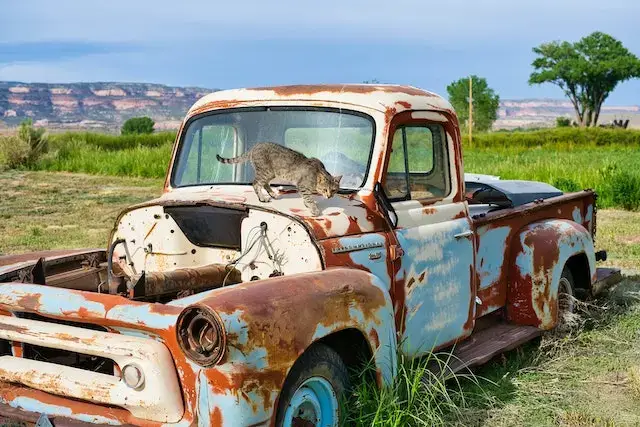
Feral cats generally don’t meow as much as stray cats. It wouldn’t be wrong to say they don’t meow.
However, if a feral cat feels threatened, they might meow. For example, if a person corners a feral cat and forces an interaction, the cat might meow.
This is one quiet cat in the neighborhood, much like that one quiet child in the classroom that has probably been beaten often or neglected at home.
Now you are beginning to feel for him, aren’t you?
Understanding Feral Cat Behavior
Observe the furry feral for the next few days, and you will surely come across the following.
Unlike stray cats that stay close to people and homes, this one hides unfriendly, escaping anyone who comes to pet him. Leave alone meowing; he does not even make eye contact with you.
You have never seen him wag his tail. Instead, he is almost always couched in places, as though to protect himself, and always hiding his tail.
Before you get mad at him, here are some things you need to know. But before that, let us first address the first question that you have before you.
Must Read: Are Stray Cats Friendly?
Why Don’t Feral Cats Meow?
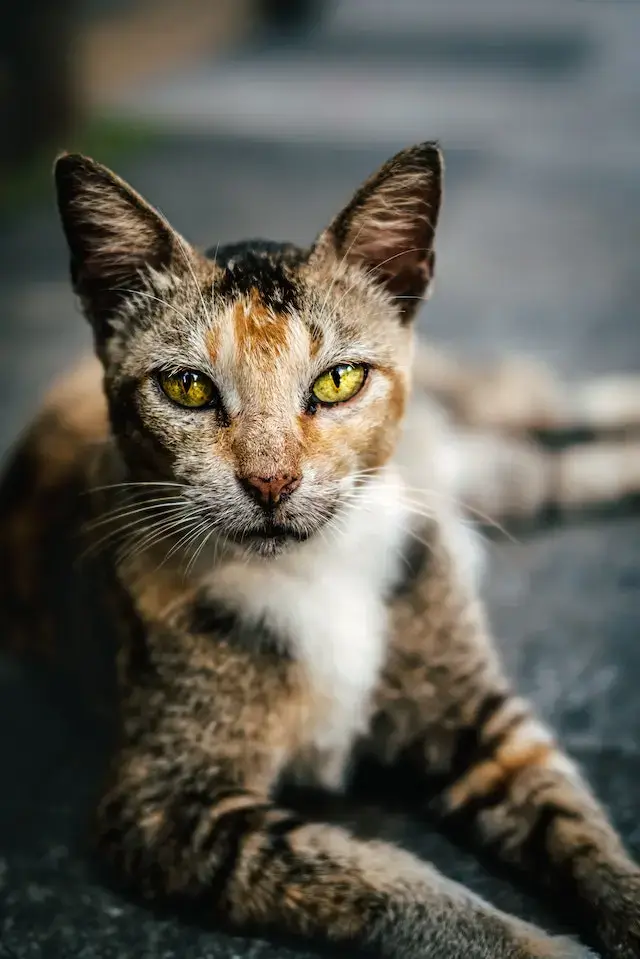
Now the main question that lies is, why are they so quiet all the time? Why can’t they at least meow?
And so, before you lose your patience with them again, listed below are the reasons. Read on to see.
1. Survival instincts
This is one furry creature that has probably never had a home. Instead, they are cats who have spent most of their lives in the wild, looking out for themselves.
They are most of the time scared of being attacked. And at other times, they could be watching out for their prey.
2. Socialization
Cats generally meow to ask for your attention or greet you. Feral cats are not used to either.
Pats and strokes are not known to him, and this lack of contact has made them fearful of humans. In other words, encountering new people makes them uncomfortable, as their unfamiliarity with human touch creates a barrier.
3. Human interaction
These are not the same as other stray cats that once lived in a home and somehow lost their way.
Instead, he would have spent most of his time being chased from place to place, and this could have, in time, made him the silent cat that often goes into hiding today.
4. Territorial behavior
Feral cats don’t like anyone messing with their territory, and her silence is one way of protecting herself from other cats and maybe even you.
So, while a stray cat will fight to defend herself, a feral will merely go into hiding and won’t meow.
5. Limited vocal range
Feral cats make different kinds of sounds as they have other things to communicate. They are not going to purr to get cute like stray cats do.
Instead, they will yowl, which is more so when they spot a threat from either other cats or you.
6. Maturity and independence
The truth is that feral cats have it more complicated than strays, and their struggles are more natural, and this has gone on to make them more mature and independent, where they are not going to meow and ask for any help from you.
Instead, she is more independent and will fend for herself, like the wise man who talks less and is much more productive.
7. Adaptation to the Environment
These things have reduced your poor furry would-be friend into the feral that he is today, so if you want to befriend him, make sure that you are gentle every step of the way.
Remember that this cat has not had it easy but has adapted herself to all the struggles that have come her way, as she has learned to survive out there in the wild, day after day.
How Do Feral Cats Communicate?
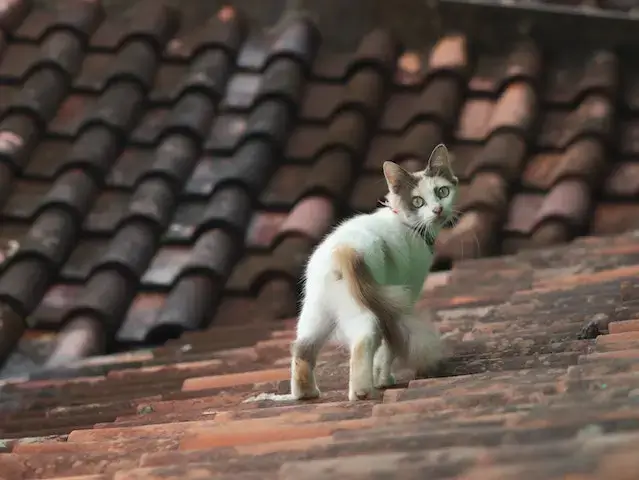
So, if they don’t meow, how do they ever communicate? Do they communicate at all?
Well, they do, and to answer the above question, here are some of the things that they do.
- Body language and visual cues:
You see, feral cats use more of their bodies than their voice, sending along a lot of visual cues. If they like you, they will look directly at you and blink. If they don’t, they will hide, so get the clue. He is going to do more of the latter, considering he is feral.
- Scent marking:
Taking off from what you read above, this is another rare case. If she does like you, she will head butt or even rub her cheek against you. You may have gone to the extent of putting some effort into making her comfortable, and by doing the above, she is now marking her scent on you.
- Vocalizations other than meowing:
Feral cats don’t meow or purr. Instead, they yowl and hiss, and this is not so much to humans as to other cats, which pose a threat to them unless they see a threat coming from you too. Have you ever had a cat on the road hiss at you?
- Physical interactions:
Again, if a feral cat likes you, she is going to follow you, sometimes all the way to your very door, staying around all the time. In other words, she has become almost a pet and is just looking for a little welcome from you.
- Subtle sounds:
This is a funny one; while a “meow” is not what you are going to hear from a feral cat on the road, what you will hear at times are some cute chirrups and chatters, and when they are angry, hisses and growls. Well, if you treat them well, that latter part is not going to be directed toward you.
Do Feral Cats Purr?
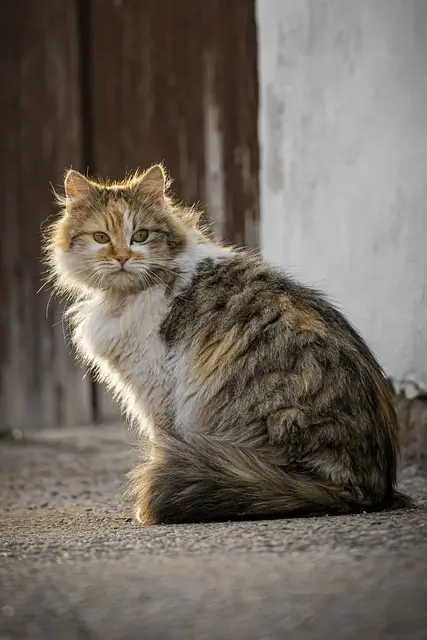
Nope, they don’t. This is something that only domestic cats do. Feral cats are trained not to purr as this could attract predators.
However, there are still some rare cases when you could have a feral cat purring at you. Now, this is one affectionate feral that would be easy to adopt and need just a little training from you.
Go ahead and pick her up. You will not always come across a friendly feral and soon be grateful for having introduced her into your home.
What Does It Mean When A Feral Cat Meows At You?
It could be that she trusts you. Know that not all ferals hate humans, and there are quite a bunch out there who want to be friends with you.
But how do you recognize them? Well, you would have seen this above.
Remember the blink, the rub, and the following? These are all signs that a feral likes you, especially if she has finally meowed at you. If you have reached this phase, know you have won yourself a feral. You, indeed, are a cat champ, and it is no doubt that most of them love you.
How Do You Know If A Cat Is Feral?
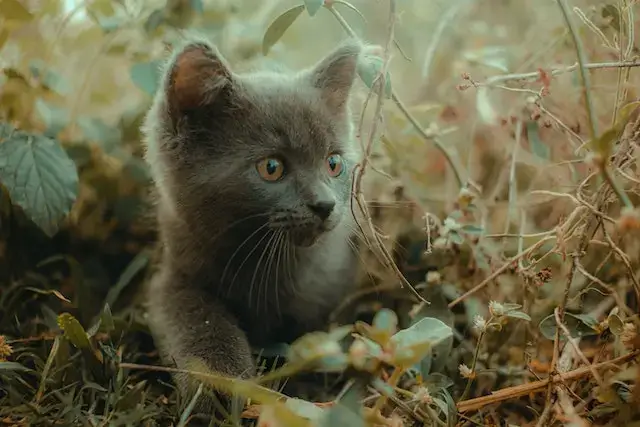
Okay, so before you go, the big question is, was the cat that you spotted a real feral or a domestic one that has managed to lose his way?
That said, here are some signs to look for if at all you need clarification.
- Avoids human contact: This one you already saw. When he is a feral, he will show you more of his tail than his face, as he always runs away from you.
- No collar or identification: The poor fellow has had no one to adopt him, so you will not find any decorative items to make him look handsome or any other sign of ownership on him.
- Hunting behavior: Unlike a stray cat, the feral cat has never had food coming ready on his plate. So, he will not come purring or meowing at you, hoping to get some food. Instead, this is a cat mostly found stalking to find its prey.
- Nocturnal activity: If you are wondering who the fellow is disturbing your sleep night after night, chances are he is a feral cat. Go ahead and give him a home. You will, in time, teach him when is the right time to sleep and how to behave, doing a favor to the entire neighborhood.
- Ears tipped or notched: Now, here you are going to see the opposite. A vet generally tips a cat’s ear as a way of telling those around that he has been spayed or neutered. So, if you see a cat like this, then know that he is not a feral cat. Or he could be a stray that has turned feral.
- Rough appearance: As feral cats have never been domesticated, they have not had anyone to wash their coat and comb their hair. So, what more do you expect? Their tongues are their only source of cleanliness. Often the fights they have could leave them bruised.
- Living in groups: You may or may not have noticed this, but feral cats tend to live in groups. This helps them work together to find food. So, if you see a group of them going about together, know they are not strays but ferals.
- Wariness: Expected. After all, who is going to look out for their safety if they don’t? So, as seen above, if you spot a scared, unfriendly cat and threaten to attack you, if you so much as come to pet him, know that this one is a feral.
Recommended Reading: Do Tortoiseshell Cats Get Along With Other Cats?
Can Feral Cats Be Friendly?
Feral cats, once taken into a home, can become warm and loving, like other cats.
They may be uncomfortable at first, as they don’t like being indoors, but give it time, and they will soon form warm bonds with you, becoming your furry friend for life.
Stray cats can turn feral, too, with the lack of human contact, but can return to their old selves when received with love once again.
Regular meals, frequent cuddles, great toy time, and, if you can, some space in your bed can all go a long way in winning you a friendly feral, only, now no longer feral.
Frequently Asked Questions
Q1. Do feral cats meow at each other?
Ans: While feral cats may display different vocalizations, it is less common for them to meow at each other. This behavior is usually connected to interactions with humans.
Q2. Do feral cats meow at night?
Ans: Yes, feral cats may meow at night for many reasons.
Q3. Why do feral cats meow at night?
Ans: Nighttime meowing can be attributed to their instinctual behaviors such as territory marking, searching for a mate, or expressing hunger.
Q4. Why do feral cats cry at night?
Ans: Feral cats cry at night due to similar reasons as meowing; this could be for territory reasons, mating calls, or because they are in distress.
Q5. Are feral cats nocturnal?
Ans: Feral cats are typically nocturnal. They often hunt, remain active at night, and sleep during the day, although this can vary.
Q6. Do feral cats meow during the day?
Ans: While it’s less common, feral cats may also meow during the day. The motivations can be similar to those causing nighttime meowing.
Q7. Do stray cats meow?
Ans: Yes, stray cats do meow, often because they are used to human interaction. They may meow to ask for food, attention, or help.
Q8. Do cats meow for humans?
Ans: Cats mostly meow as a means to communicate with humans. Unlike dogs, who use barking to communicate with each other, cats adapted their meow to communicate with humans.
The Verdict: Do Feral Cats Meow?
You don’t need us to answer that for you by now, do you? You now know enough about ferals from how often they meow and what are some of the behaviors that they are going to show you.
But if you still want a verdict, well, feral cats don’t meow. At least of them don’t, while a few of them do, and that is all about ferals for you.

